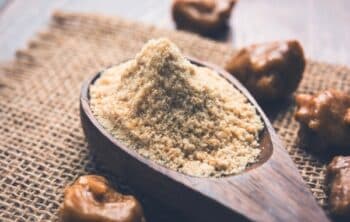Contents
Can Pregnant Women Have Cardamom? A Detailed Guide
Cardamom, often called the “Queen of Spices,” is known for its warm, aromatic, and slightly sweet flavor. This popular spice is used in a wide range of culinary dishes, beverages, and traditional remedies worldwide. However, during pregnancy, women often question whether certain foods and spices are safe to consume. One common query is: “Can pregnant women have cardamom?”
The good news is that cardamom is generally considered safe for pregnant women when consumed in moderate, food-based amounts. In this article, we’ll explore the benefits, potential risks, and safe ways to incorporate cardamom into your diet during pregnancy.

What Is Cardamom?
Cardamom is a spice derived from the seeds of plants in the Elettaria and Amomum genera. It comes in two main varieties:
- Green Cardamom (Elettaria cardamomum): The most common variety, with a sweet and citrusy flavor.
- Black Cardamom (Amomum subulatum): Smoky and earthy, often used in savory dishes.
Cardamom is packed with essential oils, antioxidants, and bioactive compounds that make it a valuable ingredient in both culinary and medicinal applications.
Is Cardamom Safe During Pregnancy?
The short answer is yes, cardamom is generally safe for pregnant women when consumed in small amounts as part of a balanced diet.
Why Is Cardamom Safe?
- Non-Toxic: Unlike certain spices that may pose risks during pregnancy, cardamom is not known to be toxic.
- Moderation Is Key: Using cardamom in everyday recipes, such as teas, desserts, or curries, is unlikely to cause harm.
However, as with any food or spice during pregnancy, it’s essential to practice moderation and consult your healthcare provider if you have specific health concerns.
Health Benefits of Cardamom During Pregnancy
When consumed responsibly, cardamom offers several health benefits that can support a healthy pregnancy.
1. Aids Digestion
Pregnancy often comes with digestive issues like bloating, constipation, and nausea. Cardamom’s carminative properties can help:
- Reduce Gas and Bloating: It soothes the digestive tract and prevents excess gas.
- Ease Nausea: The aromatic compounds in cardamom can alleviate morning sickness.
Tip: Add a pinch of ground cardamom to a cup of warm water or tea to soothe your stomach.
2. Rich in Antioxidants
Cardamom is loaded with antioxidants that help protect your cells from oxidative stress. This is especially beneficial during pregnancy when your body is undergoing numerous changes.3. Supports Oral Health
Cardamom’s natural antimicrobial properties can help:
- Prevent bad breath.
- Reduce the risk of gum infections, which can be more common during pregnancy due to hormonal changes.
Tip: Chew on a cardamom pod for fresh breath and oral hygiene.
4. Eases Heartburn
Heartburn is a common pregnancy discomfort, especially in the later stages. Cardamom can help neutralize stomach acid and relieve symptoms of heartburn.
5. Promotes Relaxation
The calming aroma of cardamom can reduce stress and promote relaxation, which is beneficial for both mom and baby.
6. Supports Circulation
Cardamom’s ability to improve blood flow can help reduce swelling in the hands and feet, a common issue during pregnancy.
Risks of Cardamom During Pregnancy
While cardamom is safe for most pregnant women, there are a few considerations to keep in mind:
1. Uterine Stimulation
In very large amounts, cardamom has been traditionally believed to stimulate uterine contractions. Although this effect is rare and typically associated with medicinal doses, it’s better to use cardamom sparingly.
Advice: Avoid consuming cardamom in concentrated forms, such as essential oils or high-dose supplements, during pregnancy.
2. Allergic Reactions
Some people may be allergic or sensitive to cardamom. Symptoms of an allergic reaction can include:
- Skin irritation.
- Difficulty breathing.
- Digestive upset.
If you’ve never consumed cardamom before, start with a small amount to test your tolerance.
3. Interaction with Medications
Cardamom may interact with certain medications, such as blood thinners or diabetes medications. If you’re on any prescription drugs, consult your doctor before adding cardamom to your diet.
How to Use Cardamom Safely During Pregnancy
If you enjoy the flavor and health benefits of cardamom, here’s how you can incorporate it safely into your pregnancy diet:
1. Use in Cooking
Add cardamom to:
- Curries and rice dishes.
- Soups and stews.
- Baked goods like cakes and cookies.
2. Brew Cardamom Tea
Boil 1–2 crushed cardamom pods in water for a warm, soothing tea. You can also add ginger or cinnamon for extra flavor.
3. Add to Smoothies
Blend a pinch of ground cardamom into fruit or yogurt-based smoothies for a unique flavor twist.
4. Chew on Cardamom Pods
Chewing on a cardamom pod can help freshen your breath and ease nausea.
Pregnancy-Friendly Cardamom Recipes
1. Cardamom Banana Smoothie
Ingredients:
- 1 ripe banana.
- 1 cup milk or almond milk.
- 1/4 teaspoon ground cardamom.
- 1 tablespoon honey (optional).
Instructions:
- Blend all ingredients until smooth.
- Serve chilled.
2. Cardamom Rice Pudding
Ingredients:
- 1 cup cooked rice.
- 2 cups milk.
- 1/2 teaspoon ground cardamom.
- 2 tablespoons sugar or honey.
Instructions:
- Simmer all ingredients until creamy.
- Garnish with chopped nuts or raisins.
3. Cardamom Ginger Tea
Ingredients:
- 2 cardamom pods.
- 1 teaspoon grated ginger.
- 2 cups water.
- Honey to taste.
Instructions:
- Boil water with cardamom and ginger for 5 minutes.
- Strain and add honey before serving.
Frequently Asked Questions (FAQs)
1. Is cardamom safe in the first trimester?
Yes, small amounts of cardamom are safe in the first trimester. It may even help alleviate morning sickness.
2. Can cardamom cause miscarriage?
There’s no evidence that cardamom in food-based amounts causes miscarriage. However, avoid excessive consumption or concentrated supplements.
3. Is cardamom tea safe during pregnancy?
Yes, cardamom tea is safe when made with 1–2 crushed pods. Avoid over-brewing or adding excessive amounts.
4. Can I use cardamom essential oil during pregnancy?
No, cardamom essential oil is highly concentrated and should not be used during pregnancy.
5. How much cardamom is safe during pregnancy?
Up to 1/2 teaspoon of ground cardamom or 1–2 pods per day is considered safe for most pregnant women.
6. Does cardamom help with nausea?
Yes, the aroma and compounds in cardamom can help reduce nausea and vomiting.
7. Can cardamom improve digestion during pregnancy?
Yes, cardamom’s carminative properties make it effective for easing bloating and indigestion.
8. Which type of cardamom is best during pregnancy?
Green cardamom is milder and sweeter, making it ideal for pregnancy-safe recipes.
9. Can I use cardamom in desserts while pregnant?
Absolutely! Cardamom adds a delightful flavor to desserts like rice pudding, cakes, and cookies.
10. Is cardamom gluten-free?
Yes, cardamom is naturally gluten-free.
Conclusion
Cardamom is a safe and flavorful addition to a pregnant woman’s diet when used in moderation. From easing digestion to reducing nausea and promoting relaxation, this spice offers numerous benefits. However, it’s essential to avoid overconsumption and steer clear of concentrated forms like essential oils or supplements.
By incorporating cardamom into your meals and beverages thoughtfully, you can enjoy its warm, aromatic flavor and health benefits throughout your pregnancy journey.
Have you tried using cardamom during pregnancy? Share your favorite recipes or experiences in the comments below!

